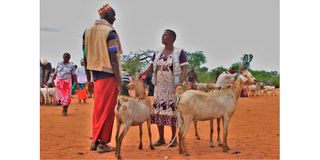Market where traders source goats slaughtered in Nairobi for ‘nyama choma’

Mary Katiki, a livestock trader, chats with a farmer at Mutha livestock market in Kitui County before buying goats.
What you need to know:
- Kyuuni market becomes lively for only six hours on Wednesdays when traders sell Galla goats.
- Buyers troop from Nairobi and Mombasa in search of the popular goat breed.
A 60-kilometre drive along the Kibwezi-Kitui Road leads one to Mutha, a sleepy trading centre near the boundary of Kitui and Tana River counties.
Inside the township there is a market called Kyuuni, which becomes lively for only six hours on Wednesdays and at the centre of trading activities are Galla goats.
The market has revolutionised livestock farming in the sparsely populated region where the sun is hot as coal fire.
While the goat sellers mainly come from the two counties, buyers troop from Nairobi and Mombasa in search of the popular goat breed.
"We link farmers and the large-scale buyers who travel from different parts of the country for Galla goats. Most of the times, the buyers send us money in advance so that we buy them the goats ahead of the market day," Mary Katiki, a broker tells the Seeds of Gold team after successfully bargaining and buying two he-goats from Abdulla Golicha, a livestock farmer from Tana River.
Every Wednesday, the mother of six normally heads to the market at dawn armed with nothing but a sweet tongue and determination.
With a 13-year experience, Mary knows how to talk well to farmers and livestock traders. On this day, she has a target of 60 he-goats to source for a regular client based in Nairobi. Each of the animals goes from Sh3,000 to Sh8,000. From each she earns a commission of between Sh500 and Sh1,000.
Mutha is the biggest Galla goats market in the arid region ravaged by drought. According to Nzenge Longosi, the chairman of Mutha Livestock Traders, most of the hundreds of goats and sheep traded weekly at the market come from Tana River, Mandera and Garissa counties.
Traders prefer young Galla goats because they produce high quality meat. Before buying, they look at the general health of the animal, in particular its dental formula.
Goats with dental deformities have problems feeding leading to poor health.
Residents whose homesteads border the livestock market make money by keeping unsold stock.
"We charge Sh20 per night for a goat. Sometimes we keep up to 100 goats. Some of the traders keep their goats with us for a week until the next market day. It is a risky business as it is prone to theft and attack by wild animals. We take responsibility in case the animals go missing. To minimise confusion, owners of the goats mark their animals with paint,” says Avia Kyalo, a resident.
As demand for Galla goats grows, most farmers have replaced the East African Small Goat with the former, a superior breed widely regarded as the king of meat and milk.
"Galla goats can last days without drinking water. Most farmers buy goats after selling green grams in April. However, August and September are the most appropriate times to buy goats. Drought ravaging the region around this time forces the pastoralist community to dispose of their livestock cheaply to cut on losses. We keep the animals until they gain sufficient weight and the market is favourable,” says Stephen Ngovu, a local teacher who is in the business of fattening goats for the market.
Temi Mutia, the executive in-charge of value addition at the Kitui county government, says the goats’ industry in the arid county is worth millions of shillings.
In 2019, the county government organised farmers in Mutha into a cooperative society after securing a lucrative market for goat meat in the Middle East. The market was, however, interrupted by the Covid-19 pandemic, Dr Temi says, but they hope trading would soon start.
When a farmer sells a goat at the market or any other in Kitui County, they are required to pay Sh40 cess to the county government for every animal.
Traders who buy the animals also pay Sh40 for each and must be licensed by the county government to ascertain that the animals are acquired rightfully. To transport the animals through counties traders are required to posses a livestock transport licence.





